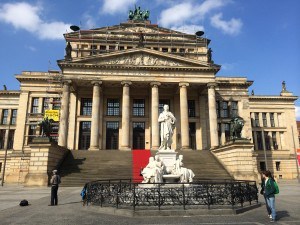Rock bottom. That’s how it feels to be a Lib Dem right now. The loss of all but one our Euro MPs, including class acts like Graham Watson, Sarah Ludford and Andrew Duff, – on top of a number of wipe-outs in the London locals – is a bitter pill indeed. Only our MPs now have to face the wrath of the post 2010 electorate.
There is something else that I feel acutely, especially here in London. It’s the end of an era. That era started for me with the Lib Dem fight against Lambeth Labour council. The party came from nowhere in the 1990s to leadership of the council. There were similar dramatic successes in Islington, Southwark, Brent, Haringey and Camden. Longer established strongholds of Richmond, Sutton and Kingston also advanced to power. Now only Sutton acts as a beacon. Small groups hang on in Southwark and Haringey, and the party remains a force, albeit diminished, in Kingston and Richmond – but the rest is almost complete wipe-out. I know many excellent councillors, devoted to serving their electors, who have now been turned out for, mainly, faceless Labour party hacks. and the loss of Sarah Ludford completes the awful picture.
There are two things that strike me from a survey of this wreckage.
The first is the failure of the party’s European election strategy, to promote itself as the only strongly pro EU party, in contrast with Ukip. This was a core vote strategy, and I strongly endorsed it as the right way to approach elections held under proportional representation. Indeed the party closely followed the advice set out by this blog a year ago – after the calamity of its confused London Assembly campaign in 2012. The result was strikingly similar to that earlier disaster. Actually support for keeping the country in the EU has risen, according to the opinion polls. It wasn’t a case of the party losing the argument over membership. But pro-EU voters did not accept that as a reason for voting for the Lib Dems. They seem to have voted for Labour and the Greens (who have mollified their previous Eurosceptic stance), and even the Conservatives. It was not enough to overcome the perceived toxicity or irrelevance of the party’s brand. Optimists in the party, including me, have assumed that the party’s unpopularity was a mid-term thing that governing parties always endure. Well it is clearly much deeper.
The second thing as that the party’s decline is not uniform. In some areas the party made a powerful showing in the local elections. Sutton in London; also Eastleigh, Cheltenham, Oxford and Watford – as well as up in Cumbria. In most of the places where the party did badly, it had the air of an exhausted old guard trying to fend off newly invigorated opponents. The Labour Party in many areas, notably Islington and Lambeth, has renewed itself, learning many lessons from earlier Lib Dem campaigning. Meanwhile the Lib Dem organisation was weakening. The councillors were spending too much energy being good councillors, and no enough rebuilding the hinterland. They hoped that being good councillors was enough to ensure being re-elected; ordinarily it might be, but not against a well-organised and well-funded opposition, especially when the national tide is out. The places that succeeded had engaged heavily in renewal. They maintained dense social networks, and had strong local leadership. Sometimes (I think Cambridge would be an example) the party did all these things and it was not enough – but without them failure was certain.
So what next? Ironically the election results show that the country needs a party espousing liberal, internationalist values more than ever. Ukip is the anti-liberal party, and the Conservative and Labour parties are now being urged to ape its views on Europe and immigration to win back lost ground. Neither party was strong on liberal values in the first place, and they will now be worse. The Greens’ record on liberal values is somewhat untested – they do have some illiberal strands of opinion – but they have failed to advance beyond the margins. They don’t have the organisational oomph, and have failed to deliver popular appeal. So Liberal Democrats do not need to doubt their party’s reason to exist.
Top of the agenda for the party now should be long-term renewal. This means recruiting motivated activists and donors. The party should hone its liberal identity to show that it is the only political movement that properly stands up for modern, liberal, internationalist values, with a priority for sustainability and humanity, rather than national and class identity and gross national income. It also means concentrating remaining organisational resources on this – and especially on recruiting and sustaining supporters in the areas where it has a weak local base. A positive online presence and organisation will be key; to much is left to moribund local organisations.
There is one more act to play in the party’s coalition ordeal: next year’s general election. The party needs to hang on to as many of its parliamentary seats as it can. Local MPs often provide the local leadership that helps the party to sustain itself. But hanging on to MPs and plotting the next coalition government should cease to be the leadership’s obsession. Rebuilding the party comes ahead of that.
And what of the leadership of Nick Clegg? Many say that he has become toxic to the party’s image – representing all that they dislike about the party. He enjoys being in power too much, and, so the public thinks, he compromises too much so that he can enjoy that pleasure. He is identified with too many coalition compromises that supporters hate (on benefit reform, legal aid, NHS reform, to name a few). He does not have a deep enough understanding of the local leadership and community politics that will be required to rebuild the party. This may be so, but somehow ditching him now seems to be the wrong thing to do. It reeks of panic. There is no obvious replacement in the wings. The party needs to rethink what it is, and what it stands for, and to choose its leader accordingly. That debate can start now, but the sensible time to conclude it will be after the 2015 election. I am not supporting calls for his resignation.
I feel very bruised. But I also feel that the country needs the Liberal Democrats to be there. We can renew and rebuild the party. And in a funny sort of way, I am even looking forward to the task ahead. I want to help.




